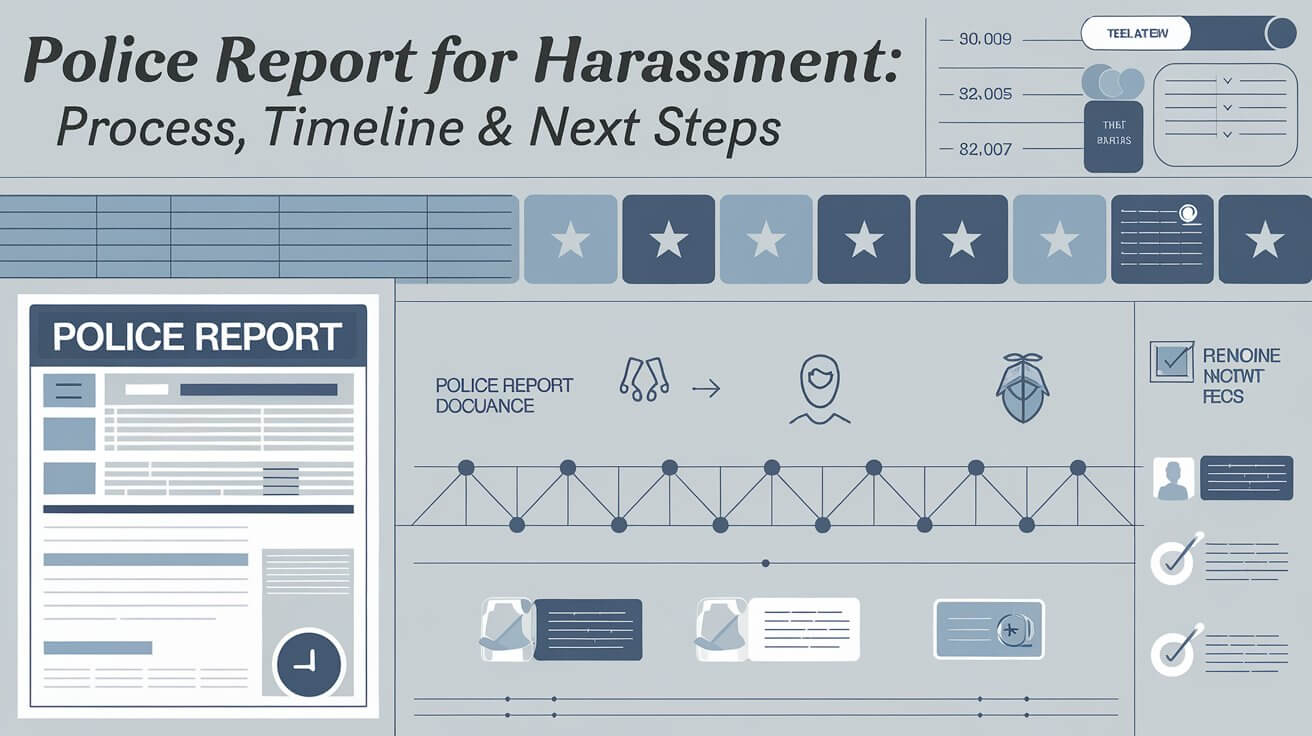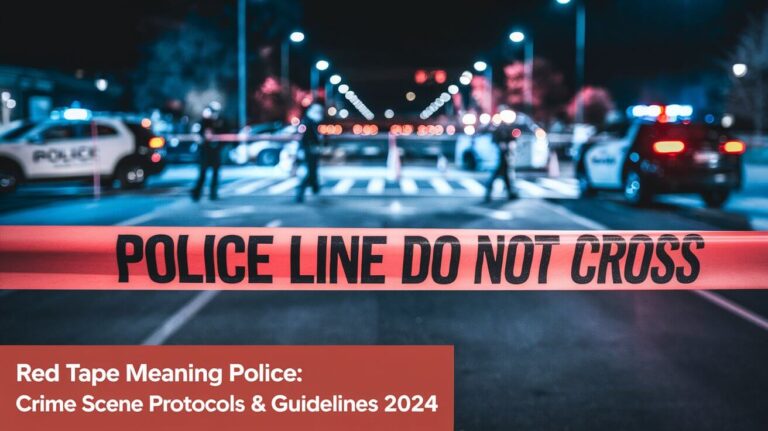Police Report for Harassment: Process, Timeline & Next Steps

Filing a police report for harassment marks the first step toward protecting yourself and stopping unwanted behavior. The police take these reports seriously and follow specific procedures to investigate your case and ensure your safety.
Steps to File a Police Report for Harassment
Emergency vs. Non-Emergency Reporting
Call 911 right away if someone is actively harassing you or you feel in immediate danger. The operator will stay on the line until help arrives at your location. For past incidents without current danger, visit your local police station or call their non-emergency number to file a report.
Required Information for Filing
The police need specific details to create a complete harassment report. Keep track of:
- Date, time, and location of each incident
- Full description of what happened
- Names and contact info of any witnesses
- Your harasser’s name and description (if known)
- Any threats made against you
- Evidence like texts, emails, or photos
Evidence Documentation Process
Save every piece of evidence that shows the harassment. Police officers review:
- Text messages and call logs
- Voicemails
- Emails and social media messages
- Letters or notes
- Photos of property damage
- Security camera footage
- Witness statements
Don’t delete anything, even if it’s upsetting. Each piece helps build a stronger case.
Police Investigation After Filing Your Report
Initial Review Process
After taking your report, officers:
- Review all evidence provided
- Document visible injuries or damage
- Take witness statements
- Assess immediate safety concerns
- Determine if crimes occurred
- Create an official case file
The responding officer decides if immediate action is needed based on the evidence and threat level.
Detective Assignment and Follow-up
More serious harassment cases get assigned to a detective who:
- Reviews the initial report
- Conducts additional interviews
- Gathers more evidence
- Speaks with the accused person
- Updates you on case progress
- Decides if criminal charges apply
Detectives may take several days to contact you after the initial report.
Witness Interviews and Evidence Collection
The investigation includes:
- Speaking with all witnesses
- Collecting security footage
- Reviewing phone records
- Documenting patterns of behavior
- Taking photos of evidence
- Recording official statements
This process builds the legal case against your harasser.
Legal Actions Following Your Harassment Report
Criminal Charges Process
If evidence shows criminal harassment, the police:
- Forward the case to prosecutors
- Arrest the suspect if warranted
- File formal criminal charges
- Request protection orders
- Schedule court hearings
- Notify you of case status
The prosecutor decides whether to pursue criminal charges based on evidence strength.
Court Proceedings and Testimony
Criminal cases involve:
- Initial court hearings
- Evidence presentation
- Witness testimony
- Victim statements
- Judge or jury decisions
- Sentencing if convicted
You may need to testify, but many cases resolve without trial through plea agreements.
Protection Orders and Enforcement
Courts can issue orders that:
- Ban all contact with you
- Keep the person away from your home/work
- Prohibit any communication
- Set criminal penalties for violations
- Require surrender of weapons
- Allow arrest for any violations
Police enforce these orders immediately when violations occur.
Additional Protection After Filing
Safety Planning Options
Create a safety plan including:
- Emergency contacts list
- Safe places to stay
- Escape routes from home/work
- Copies of important documents
- Changed locks and passwords
- Security system updates
- Transportation options
Share your plan with trusted friends and family.
Documentation Requirements
Keep detailed records of:
- All contact attempts
- Protection order violations
- New threats or harassment
- Witness information
- Police report numbers
- Court dates and outcomes
- Medical treatment needed
- Property damage costs
These records strengthen your case if more legal action is needed.
Civil Legal Options Beyond Police Reports
Filing Civil Lawsuits
Beyond criminal charges, you can:
- Sue for monetary damages
- Request restraining orders
- Seek compensation for losses
- File workplace complaints
- Request school safety measures
- Pursue anti-harassment orders
Civil cases require less proof than criminal cases.
Compensation and Damages
Civil courts may award money for:
- Medical bills
- Therapy costs
- Lost wages
- Property damage
- Moving expenses
- Security measures
- Pain and suffering
- Emotional distress
Keep all receipts and documentation of expenses.
Common Questions About Harassment Reports
Time Limits and Requirements
Key timing facts:
- No time limit exists to report harassment
- Earlier reporting helps preserve evidence
- Statute of limitations affects prosecution
- Protection orders need current threat proof
- Civil suits have legal filing deadlines
- Report updates accepted anytime
File as soon as possible after incidents occur.
Evidence Types Accepted
Police accept many evidence forms:
- Written messages
- Audio recordings
- Video footage
- Photographs
- Witness statements
- Medical records
- Property damage proof
- Electronic records
More evidence types strengthen your case.
Report Amendments
You can add information by:
- Visiting the police station
- Calling the assigned officer
- Providing new evidence
- Reporting new incidents
- Updating contact details
- Adding witness information
Officers document all updates to your case.
Resources and Support Services
Victim Advocacy Programs
Free support services include:
- Safety planning help
- Court accompaniment
- Protection order assistance
- Housing resources
- Counseling referrals
- Support groups
- Legal aid connections
- Emergency shelter
Advocates guide you through the entire process.
Legal Aid Services
Free or low-cost legal help offers:
- Case evaluation
- Court representation
- Document preparation
- Rights explanation
- Protection orders
- Appeal assistance
- Immigration help
- Compensation claims
Many programs serve harassment victims.
Mental Health Support
Professional help includes:
- Crisis counseling
- Trauma therapy
- Support groups
- Safety planning
- Coping skills
- Family counseling
- Stress management
- Recovery programs
Your health matters during this process.
Filing a police report starts your path to safety from harassment. The police and support services work together to protect you and hold harassers accountable. Document everything, know your rights, and reach out for help when needed. Your safety comes first, and resources exist to support you every step of the way.
Remember to follow up on your report and keep all new evidence. Stay in contact with assigned officers and support services. With proper documentation and persistence, the legal system can help stop harassment and protect your well-being.






